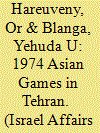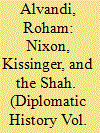| Srl | Item |
| 1 |
ID:
190987


|
|
|
|
|
| Summary/Abstract |
As a close ally of Shah Muhammad Reza Pahlavi, Israel participated in the September 1974 Asian Games – the ‘Asian Olympics’ – that were held in Tehran. Among the 18 sports in which athletes competed, football attracted the most attention, especially after Iran’s historic victory over Israel in the AFC Asian Cup in 1968. As both countries reached the final of the Games’ football tournament, the match came to be seen by Iranians as nothing short of war. Standing in stark contradiction to the close and multifaceted relations between Jerusalem and the monarchical regime, this public attitude was lost on Israeli decisionmakers in what foreshadowed the failure to anticipate the Islamic revolution and the attendant collapse of Iranian-Israeli relations five years later.
|
|
|
|
|
|
|
|
|
|
|
|
|
|
|
|
| 2 |
ID:
112148


|
|
|
|
|
| Publication |
2012.
|
| Summary/Abstract |
The Nixon Doctrine marked a turning point in American strategies of containment in the Persian Gulf. Whereas Lyndon Johnson had sought to balance Iran and Saudi Arabia as the "twin pillars" of the region during the British withdrawal "east of Suez," between 1969 and 1972 Nixon gradually adopted a policy of Iranian primacy. Declining Anglo-American power does not provide an adequate explanation for this shift in U.S. Gulf policy. These constraints confronted both Johnson and Nixon, yet each president adopted quite distinct Gulf policies. Drawing on American, British, and Iranian sources, this article makes the case that the shift in U.S. Gulf policy from balancing under Johnson to Iranian primacy under Nixon reflected a change in American thinking about the shah of Iran, Muhammad Reza Pahlavi. This change in American thinking provided fertile ground for the shah's relentless efforts to secure Washington's backing for Iran's regional primacy throughout the 1970s.
|
|
|
|
|
|
|
|
|
|
|
|
|
|
|
|